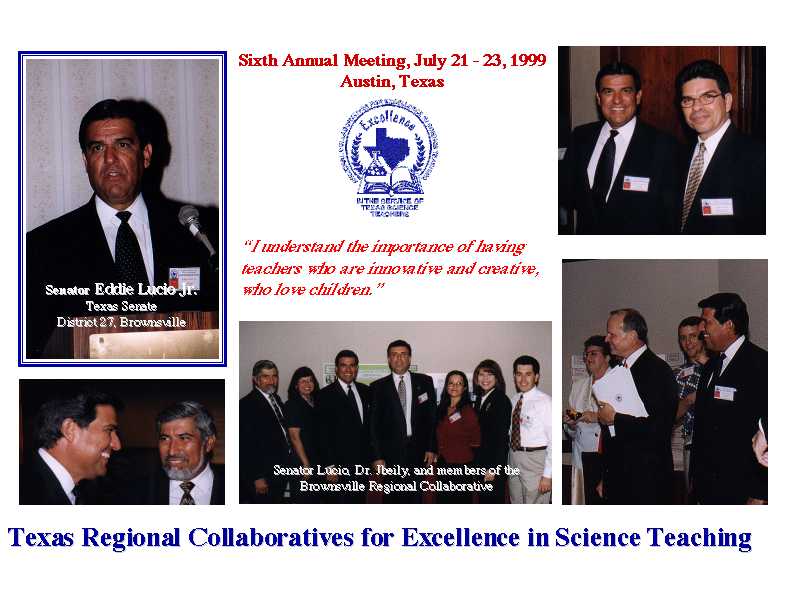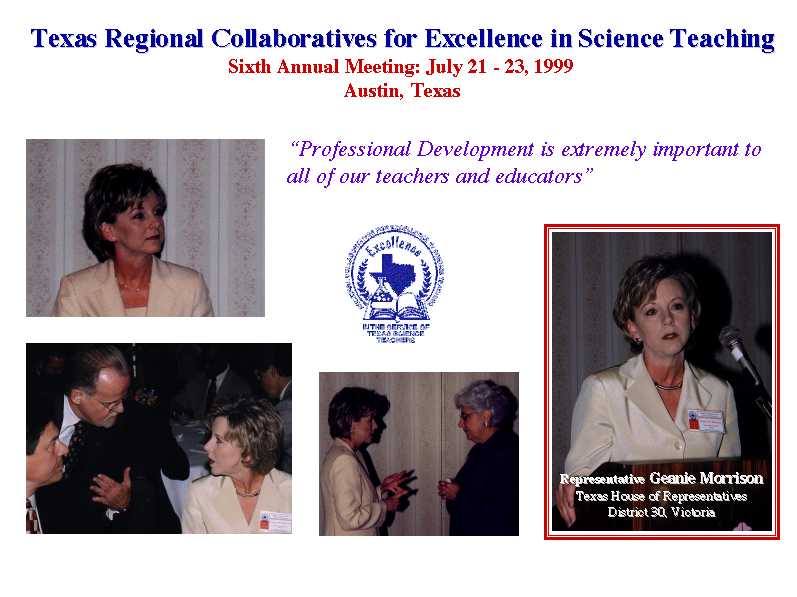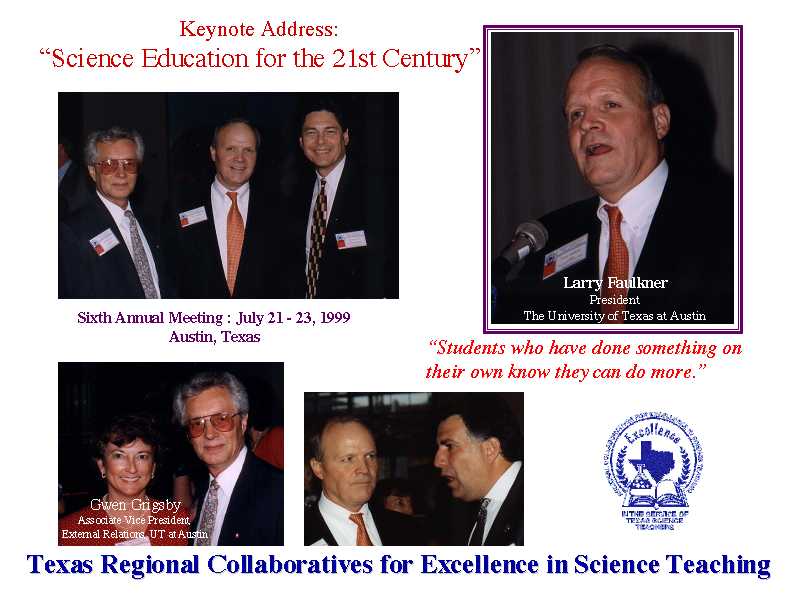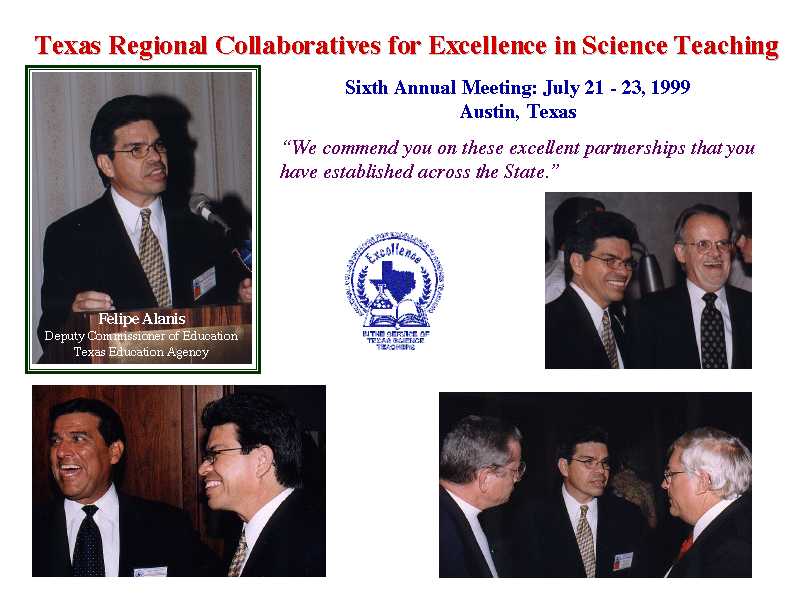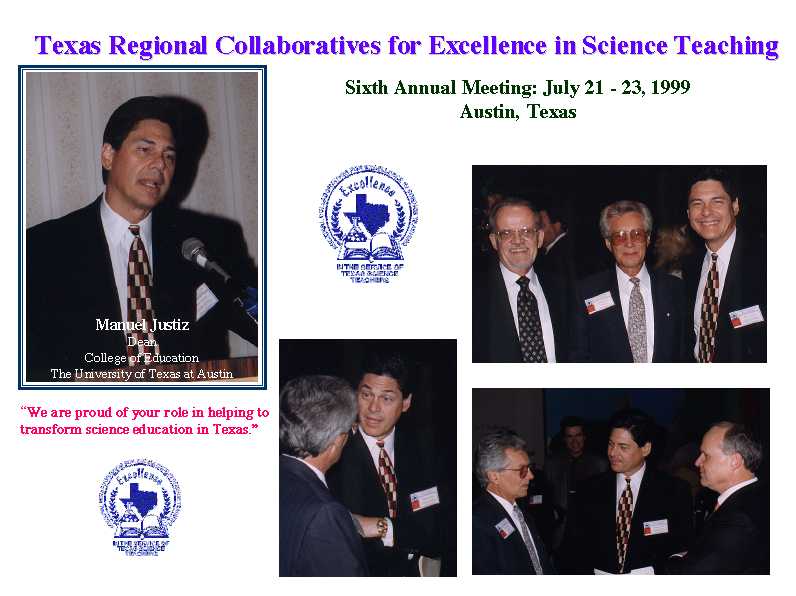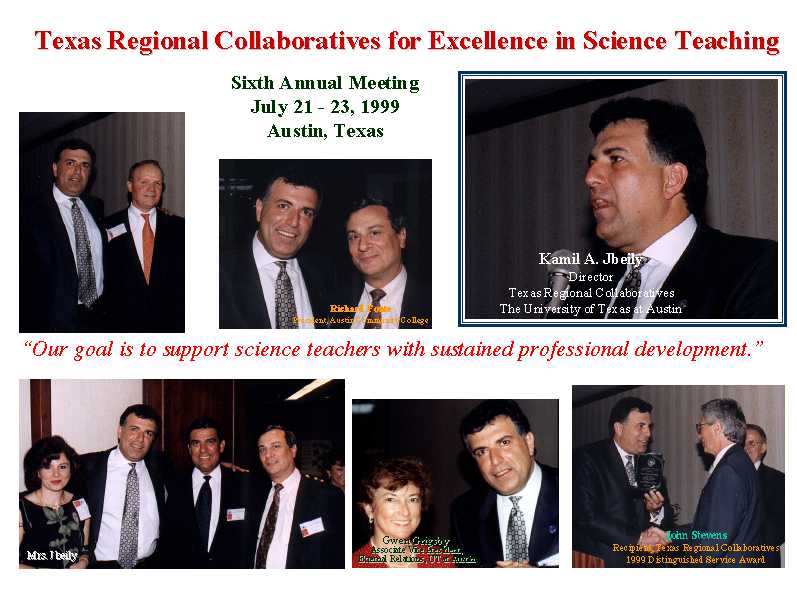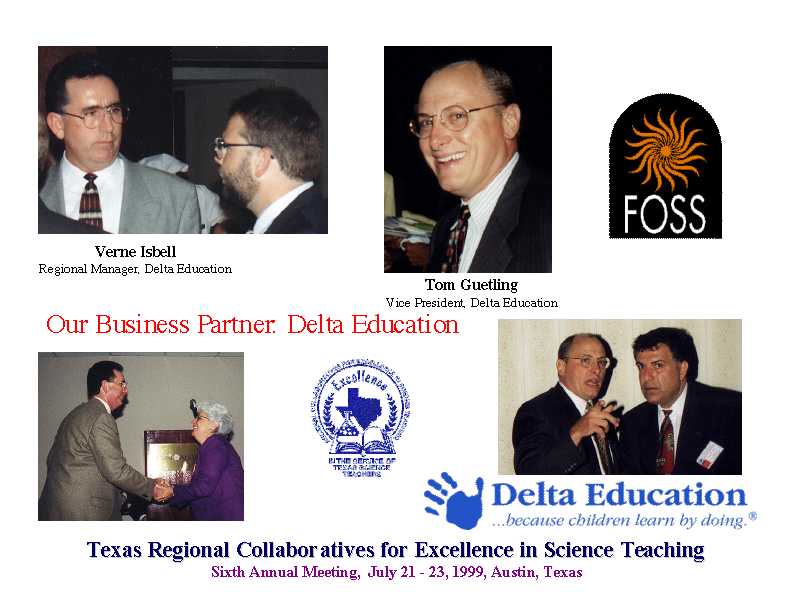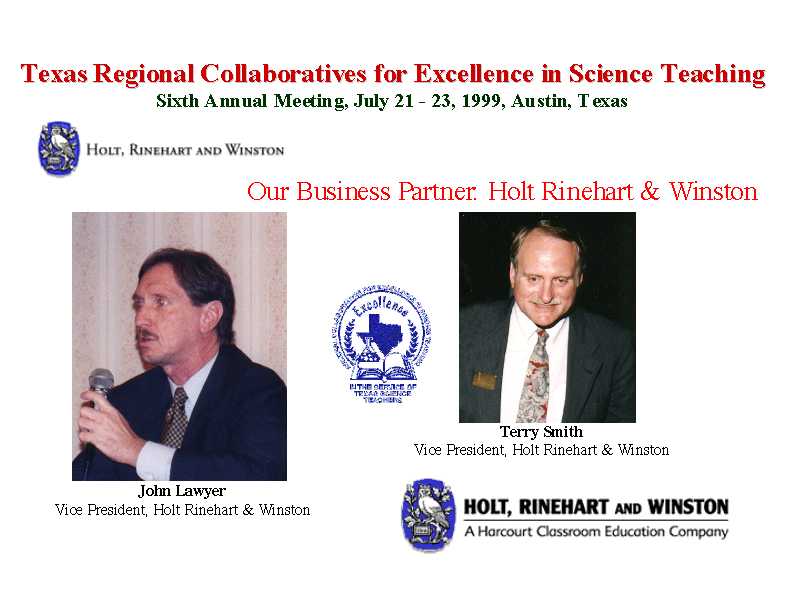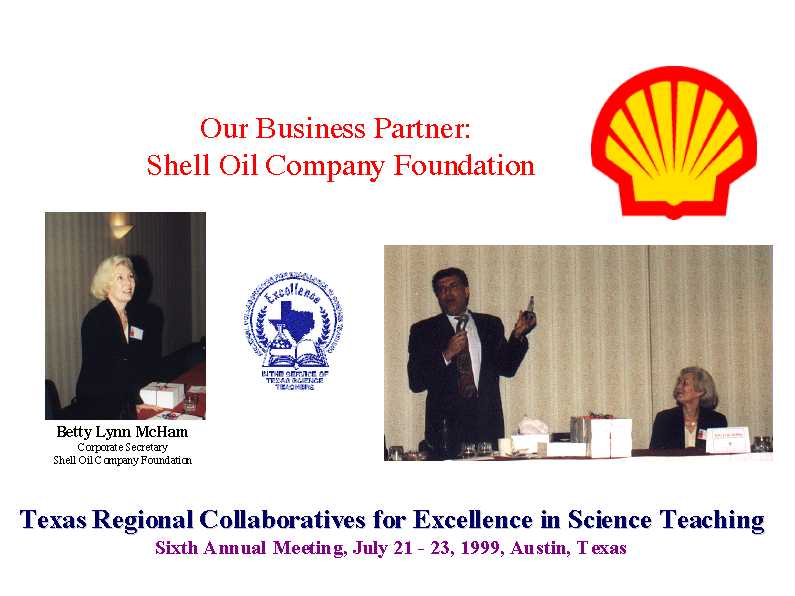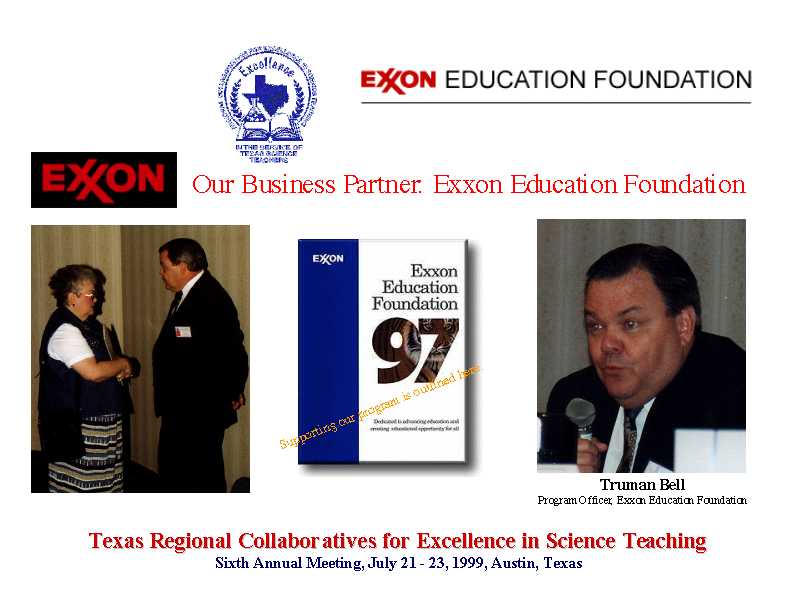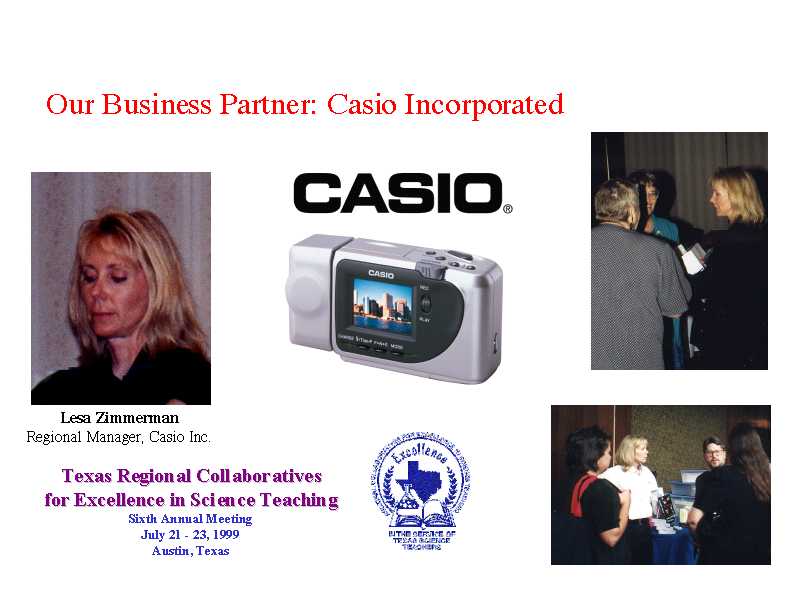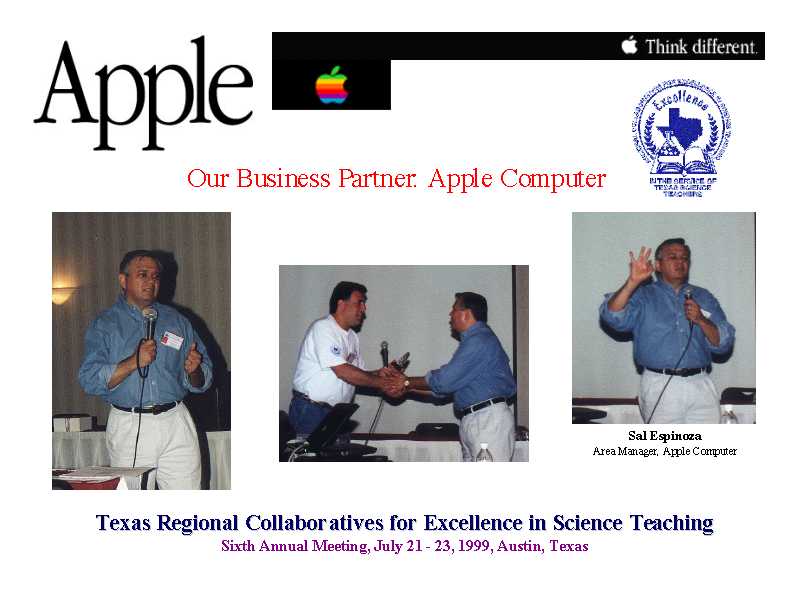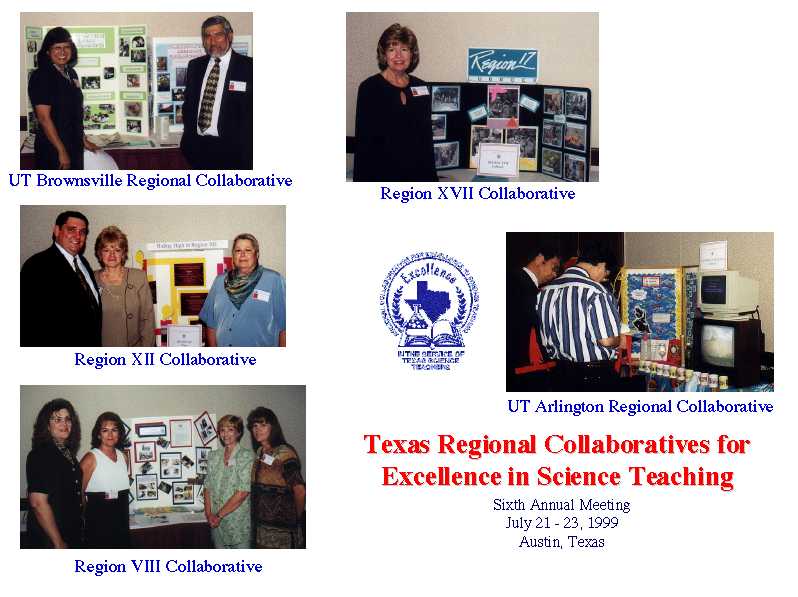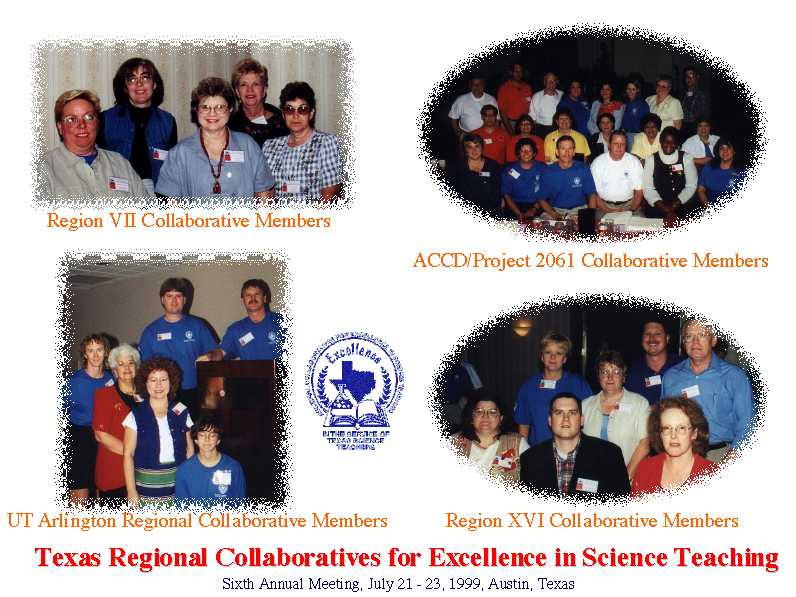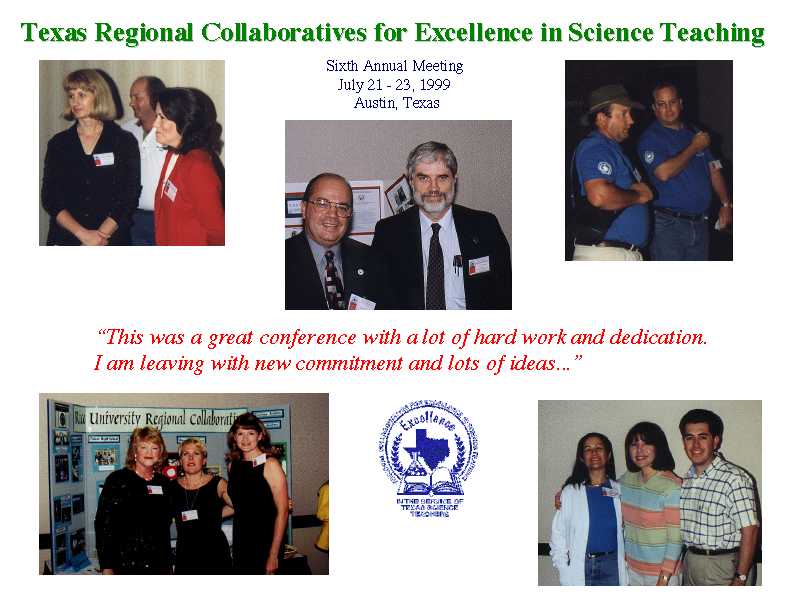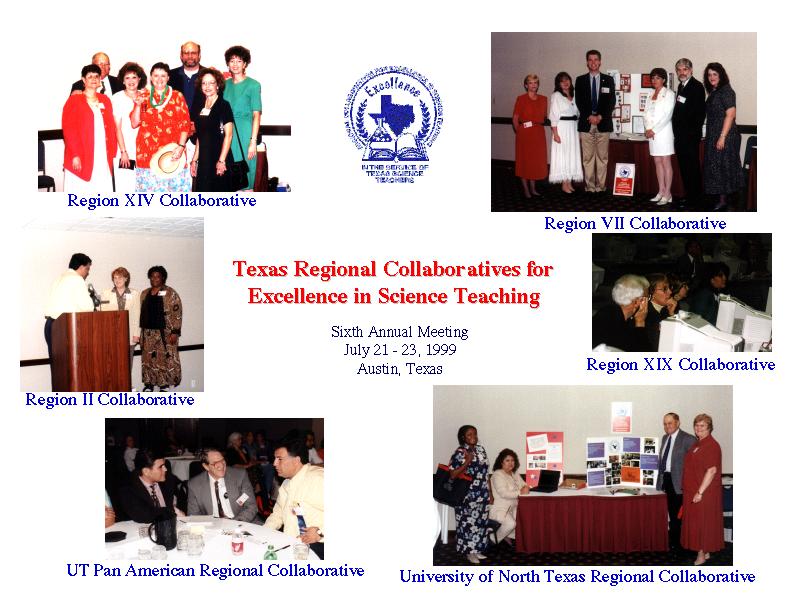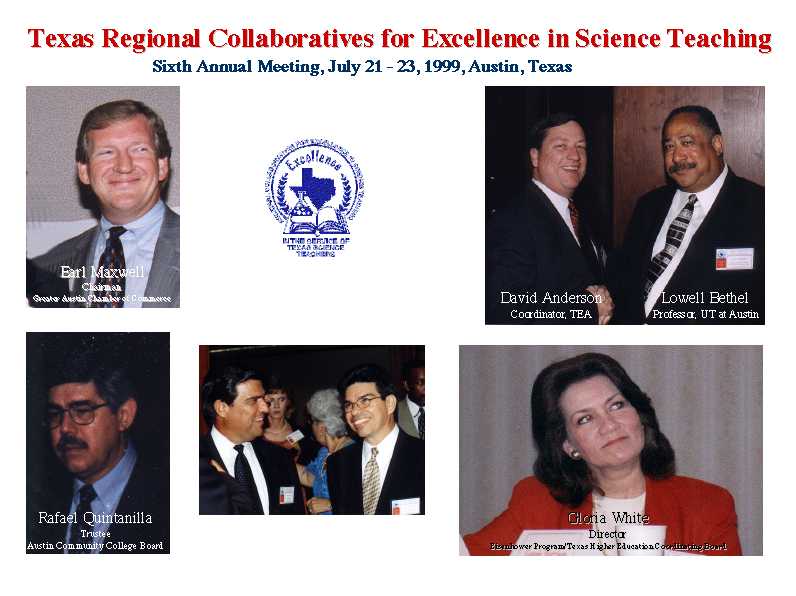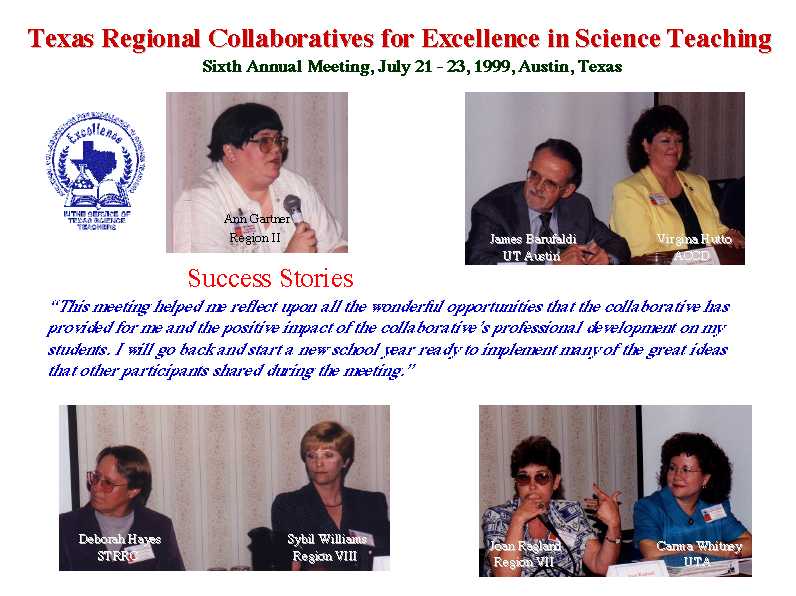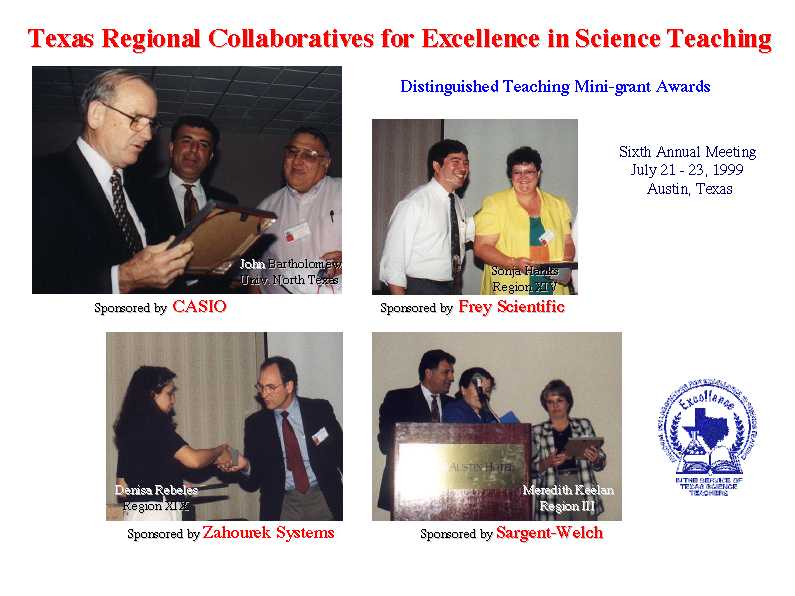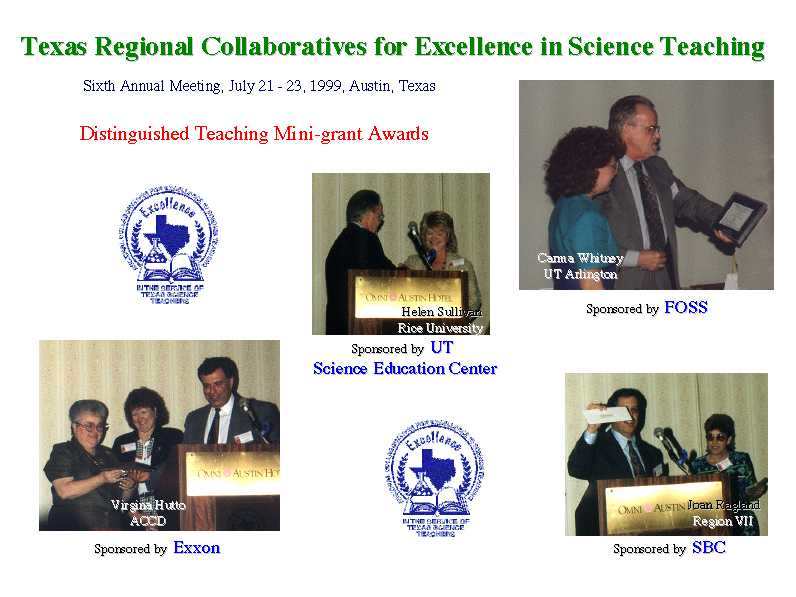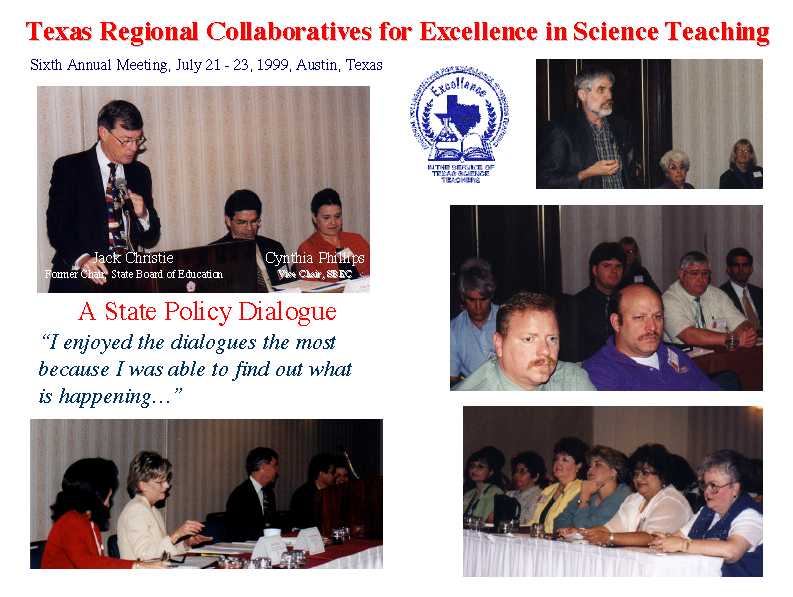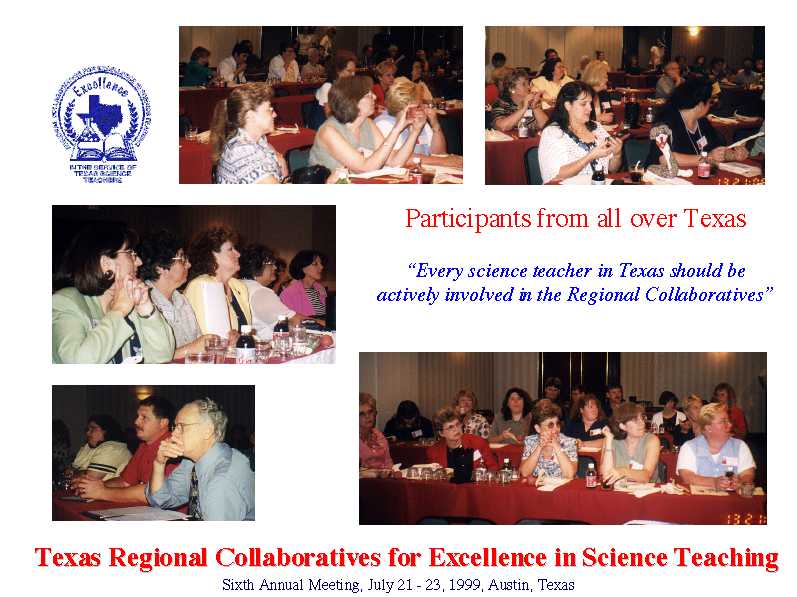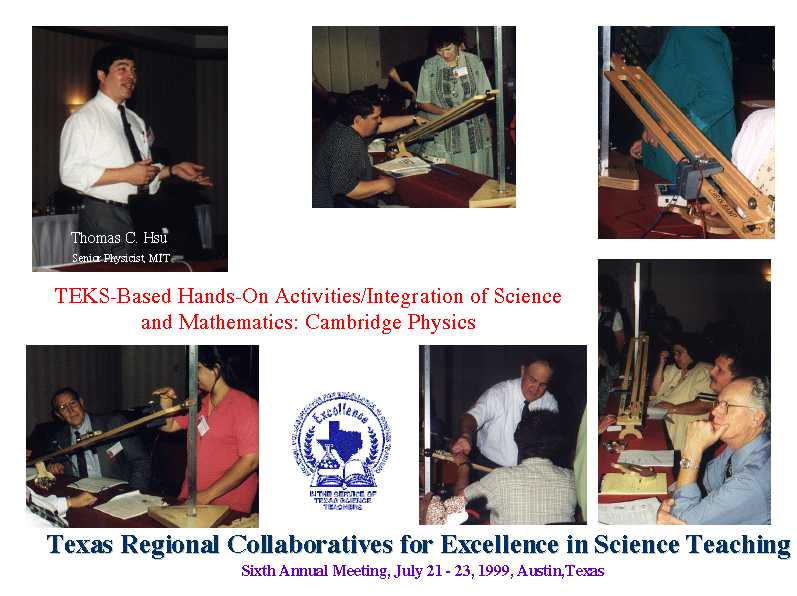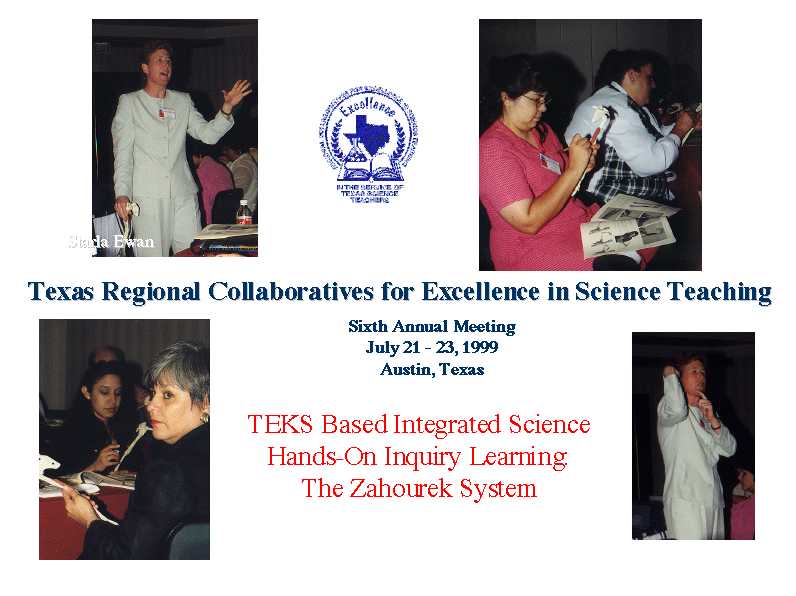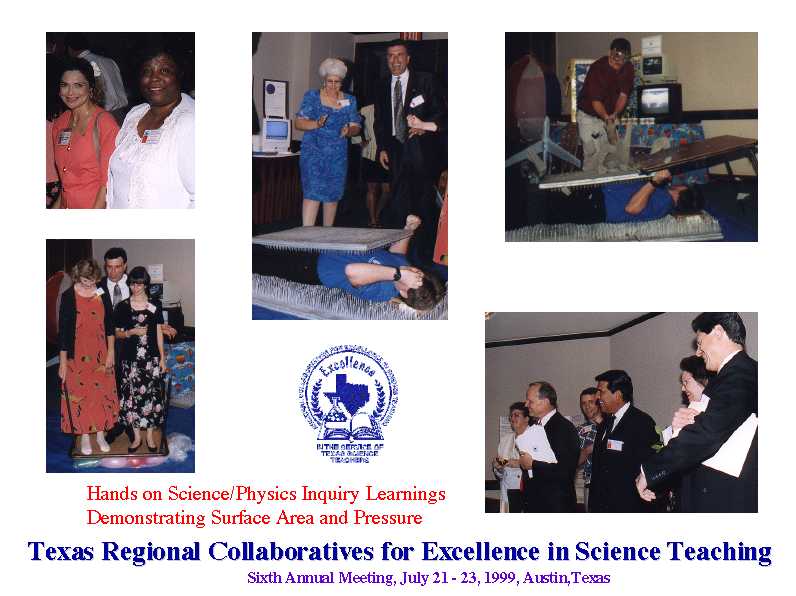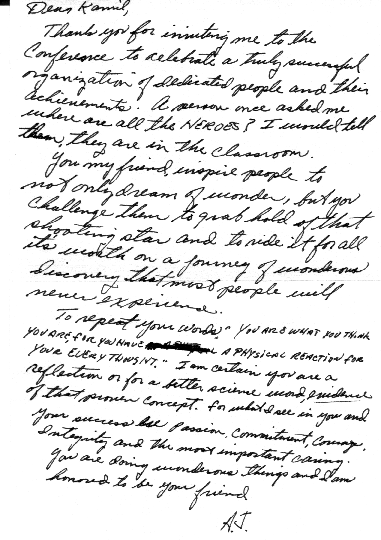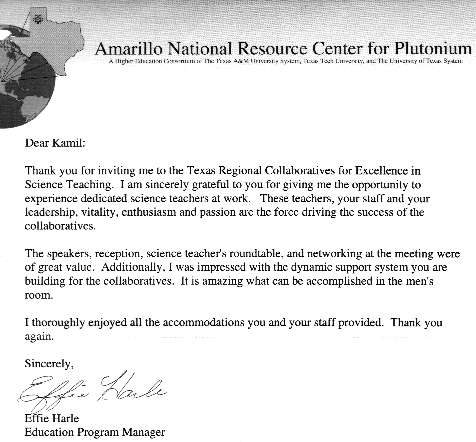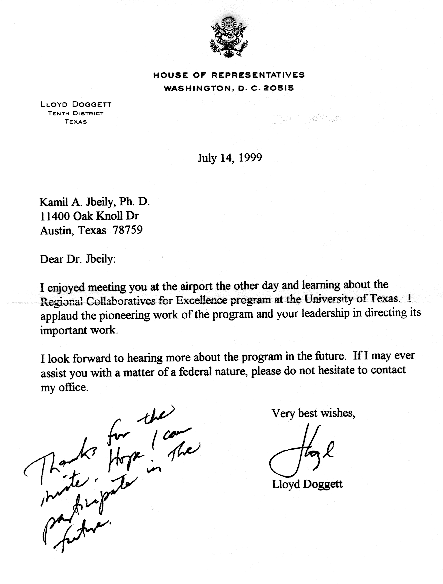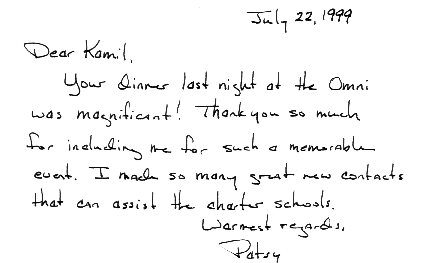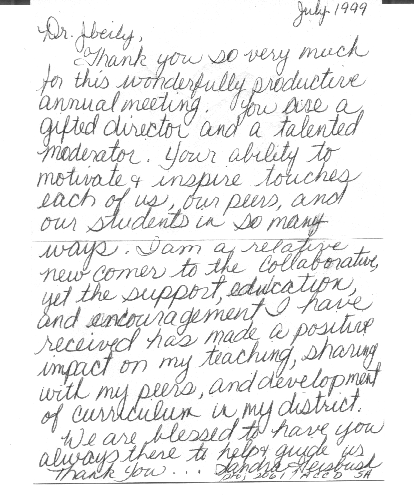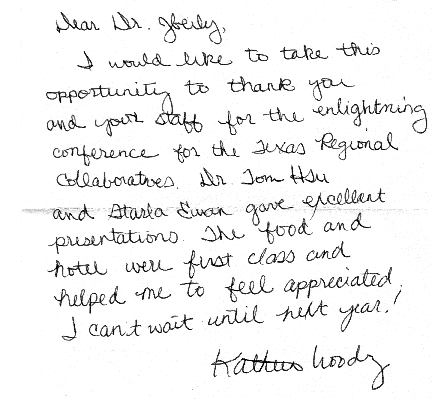Texas Regional Collaboratives for Excellence in Science Teaching
Sixth Annual Meeting, July 21 – 23, 1999
Reception sponsored by:
- The University of Texas at Austin, College of Education/Science Education Center
- Texas Regional Collaborative for Excellence in Science Teaching
- Holt Rinehart & Winston, a Regional Collaborative Business Partner
Downloadable agenda can be found here (PDF)
Reception
Business Partners
Galleries by Regional Collaboratives
Panel Discussions, Awards, and TEKS-Based Hands-on Professional Development Activities
Comments from the Participants
- Don’t change anything! This was a wonderful meeting. Thank you for all the work that was done to provide terrific speakers, delicious food and very comfortable accommodations. This meeting gave me an opportunity to reflect upon all the wonderful opportunities that the collaborative has provided for me and the impact those opportunities have had on my students. I will go back and start a new school year ready to implement many of the great ideas that other participants shared during the meeting. I look forward to another year of growth for my students and will be back next year to share and learn. Again, thank you for all your hard work.
- PDA training on computers for webpage creation—this was wonderful—[need] more hands-on—Cambridge Physics—Gears, Levers, Pulleys, Rollercoaster.
- Assessment and evaluation expectations helped me to know what the Regional Collaborative expectations are for teachers next year. I also feel that they will give me directional guidance in writing a successful Exxon grant and other grant endeavors. Your enthusiasm is exciting.
- I can’t understand why every science teacher in Texas is not actively involved in the collaborative.
- Along with the gallery we should have an opportunity for the collaboratives to speak in front of the group and discuss what they are doing. This will give a chance for us to elaborate on what we have on our display. I also think we need smaller sessions in interest groups (i.e. elementary, middle, and high) to discuss (in a smaller setting) problems, ideas, etc… I really did not get anything from the business partners discussion. Suggestion: are you keeping track of the number of people attending each session? There were sessions that had many participants and some with very few. Overall, a great conference! Thanks so much for your support!!
- Need some smaller sessions and feedback or debriefing sessions. Give topics/questions/outlines on agenda or as handouts, especially ESTT info handouts. We would like to see a 10-minute presentation from 5 to 7 of the collaboratives each year—highlight them—some others each year. Unless you highlight collaboratives individually in a session, we really don’t get time to see them all. Thanks!
- I enjoyed the dialogues the most because I was able to find out what is happening. Thank you! Kamil—I love your enthusiasm. You’re contagious. More people need to be like you! Thank you for your love of education.
- Suggestions: (1) Have teacher mentors/stories before partner panel (same day). The businesses need to hear this—it should set the stage. (2) We need new collaborative partners that can address the needs of rural and small districts or we need to help the current partners understand how rural or small districts may teach 2-5 preps, therefore the number of teachers reached may be small but the student impact may be big! This is the second year that this issue was a concern, but has not been addressed. Need a scientist with each collaborative teacher to work with and rub shoulders. Comments: Great conference! High level and quality staff to coordinate all the activities. Thank you Joel, Sandy and Alana for all your help and support—you did a great job!! Great balance and good positive recognition for all collaboratives! With each group being at a separate place, this is very important! Each team has great leadership, diversity and dedication. Thanks Jim and Kamil for your dedication, hard work and ability to continue year after year.
- More hands-on activities—possibly given by teachers. [Need] peer evaluation.
- Would like to see each Regional Collaborative demonstrate some of the things that they are doing. Maybe give each group about ten minutes to “show their stuff.”
- [Need] specifics on grant writing follow-up and assessment. HELP! [Need] ideas on recruiting and encouraging other teachers to come for mentoring without appearing boastful.
- Great meeting! [Ideas]: Information on becoming certified in science shortage areas. University of Texas at Austin programs in science education. Using the Regional Collaboratives as a route to teacher certification/advanced degrees in science education. Certificates from program meeting/summer meetings to use as part of professional development portfolios/requirements. Workshop on portfolios. Informing school districts about teachers participating in the collaboratives.
- Panel of mentors was OK but Stories of Success could be shared in smaller groups with members from various collaboratives in a more intimate setting where more could share in a shorter time. Some small group sharing is often very refreshing and more people can feel “heard” and renew a commitment to their goals. Maybe a session could be set up for some of this vital sharing. Thursday was a bit of a marathon! I would have been more refreshed and therefore more receptive to the presentations in the afternoon if an hour for regrouping, relaxing, etc. would have been built in just after lunch. It would be better to go a bit longer or start a bit earlier to allow a chance for lunch to settle and for us to get a second wind! Awards and incentives should certainly reward and recognize the efforts of those “old timers” who do so much for so many. How about a part of the program to recognize and encourage some of the excited and innovative new comers, as well! The major recognition could go to the deserving long-serving members, but maybe a certificate and small incentive recognizing contributions of relative new comers would go a long way in maintaining mentor-dedication and development. I believe the partners who support this recognition program would be willing to support this idea. This was a great conference with a lot of hard work and dedication quite evident! I am leaving with new commitment and lots of ideas. The timing is good—not at the end of the school year but just before we go back when we are fresher and more receptive to ideas. Thanks for everything.
- Aside from the updates and awards and the sessions, please focus on one specific innovation that either one collaborative excels in and have a workshop for all of these or divide the teachers into their science field and have one collaborative assigned to handle this for one whole day. Involve companies like Casio or Apple or other book companies only in terms of the use of their technology and lectures, but have the workshop instructional planned-based and “implementable” in class.
- [Need] opportunities to practice developing and presenting programs to collaborative partners. This is a great conference—good job!
- Portfolios for teachers. How about an IBook for Project Directors? I thought that this was the best meeting of the 6!
- Additional focus on teachers. Next year, focus/honor the teachers. Have exemplary master teachers serve as key speakers/moderators. Ask administrators to participate; focus on the school/teaching/learning—student achievement.
- [Need] more of the [hands-on and technological] activities.
- Great conference!
- Great!!! Thanks for a great experience! Include more hands-on activities with handouts next year!
- Thanks: Kamil, Sandy, Joel—for another great conference, your efforts are greatly appreciated as always.
- Well done—as always—we always leave feeling like we can walk on water! It is like a revival. Thanks so much!
- As usual, the three days was invigorating and rejuvenating. Thanks!
- I would like to see break out sessions or 15-minute presentations from 3 collaboratives per day. This way we would have 9-10 informative, in-depth sessions with the collaboratives. Tom Hsu was great!
- Smaller groups would be nice! More on web page creation.
- Thanks! A valuable think-tank. Nice collaboration. Please allow a 30-45 minute break after lunch on Thursday. Our bodies need a break from sitting so long! I will return the next two years!
- It may be good for a session where one or two “Success” stories with students from a region is presented to the Business Partners so partners can hear first-hand accounts [of] how our students directly benefit from what we teachers gain from collaborative participation.
- [Need] more time and training on how to network with business, industry, and higher education.
- More hands-on activities—maybe like a mini-Cast! Iniquity-based learning. Grant writing. TAAS testing at the 5th grade level.
- All speakers should have handouts for participants to follow their slideshows. We need more “hands-on” instructions like Cambridge. Panels need to be done in small groups. Break groups according to “like” topics/title etc.
- Kamil is a very energetic—dynamic—speaker. Enjoyed the conference very much.
- Very excellent conference.
- Schedule Stories of Success at a time when corporate sponsors are likely to be present. Address issue of small rural districts.
- I would like much more time given to dialogue. I suggest some group sessions with members of other regional collaboratives to share more of problems and successes.
- I found there were surprisingly few teachers from the Austin Independent School District and other area districts in attendance. What can the collaborative do to help improve this?
- More hands-on demos from teachers.
Personalized Feedback Cards and Letters
Evaluation Assessment
These were common suggestions and comments voiced by the participants:
- The individual collaboratives should play more of a role in the annual meeting. Some suggestions include presentations from three to five of the collaboratives per day, allowing each collaborative to share the activities and experiences that have promoted professional growth among their members throughout the year. Also, it was suggested that one or two collaboratives could be “highlighted” at each annual meeting, allowing a special session for them to share experiences or to give a workshop on an especially creative activity that they found useful.
- Panel discussion groups should be smaller. Specifically regarding the Science Teachers Roundtable, participants feel that sharing would be more effective if it was done in smaller groups. This would allow more people to share their experiences. It would also be a more efficient way to facilitate question-and-answer periods by overcoming the problems participants have with hearing what others are saying.
- We had several comments about the length of the conference on Thursday, especially because it did not include a break during or after lunch. People expressed the willingness to begin earlier or end later on Thursday (or the second day of the conference) in order to provide for an hour break after lunch that would allow participants to more receptive and involved in the afternoon sessions.
- Handouts for each session would be helpful. This would enable participants to take back notes and details from the sessions that they find applicable to their collaboratives and classrooms.
- Participants were most impressed with the “hands-on” activities like those in the Cambridge Physics session. This gives them specific lessons and activities to take back to their students and to share with other teachers.
- There is a need for a session dealing with small, rural district issues. This would be of assistance to all of the rural collaboratives and also to the business partners by giving them an insight into these issues and how they can better aid those districts that are in need.
Press Coverage
Future of Texas Economy To Be Glimpsed at 6th Annual Texas Regional Collaboratives for Excellence in Science Teaching
Growing new “Silicon Valleys” that will generate thousands of new jobs in a booming, high tech Texas economy of the future isn’t too farfetched an idea for Dr. Kamil Jbeily, who directs a unique statewide science education program from the UT-Austin College of Education.
His vision, the critical shortage of new science teachers in Texas, and competition from other state educational systems will be openly debated at the 6th annual meeting of the Texas Regional Collaboratives for Excellence in Science Teaching, which begins Wednesday, July 21 with a visual display of science exhibits at 6 p.m. in the Austin OMNI Hotel Downtown.
“This three-day conference begins with a visual display of a Texas science teacher lying across a bed of nails with a cinder block balanced on his chest,” explained Jbeily. “Then a science educator from UT-Arlington will smash that block on his chest with a sledgehammer, illustrating the principles of pressure.
“And we’ll have other visual displays from 18 other Regional Collaboratives from Texas,” added Jbeily. At 7 p.m., more than 250 guests–mostly college presidents, master science teachers and corporate executives–will hear Dr. Larry Faulkner, president of The University of Texas at Austin, deliver a keynote address on “Science Education for the 21st Century.”
On Thursday, July 22 at 1 p.m. in the OMNI Ballroom, famed MIT physicist, Dr. Thomas C. Hsu will demonstrate how classroom teachers can better teach about acceleration and speed by using a wooden car moving on an adjustable ramp with electronic timers, followed by other exhibits.
The conference is funded by corporate business partners of the Texas Regional Collaborative program, including foundations from the Shell Oil Co., Southwestern Bell and Exxon; the Texas Business Education Coalition; CASIO Incorporated; Delta Education; Apple Computers; and Holt Rinehart & Winston.
More than 6,000 science teachers and 600,000 Texas students have been served by Texas Regional Collaborative programs, which also receive major funding support from the Eisenhower Fund and the National Science Foundation, working through Dr. James Barufaldi, director of the UT College of Education’s Science Education Center.
On Thursday, July 22 at 8:30 a.m. in the OMNI Ballroom, Dr. Jack Christie, former chair of the State Board of Education will conduct a panel exploring Texas policy challenges and opportunities featuring elected officials and senior administrators from the Texas Education Agency and Texas Higher Education Coordinating Board.
Later at 4:15 p.m., UT Austin’s Barufaldi will lead a “Mentors Roundtable” focusing on classroom success stories in science teaching statewide in the OMNI Ballroom.
“These three days are about enhancing our state’s science teaching, while also developing students’ scientific and technological literacy, which will be needed more than ever before to fuel the Texas economy and compete–not only with other US states–but globally,” said Barufaldi.

Higher Education Notes – Wednesday, July 21, 1999
Science education conference -Today through Friday. Science Education for the 21st Century, a three-day conference that will explore ways to improve the teaching of science and attract more education students, opens in Austin today with a noon luncheon at the Omni Austin Hotel, 700 San Jacinto St.
The sixth annual meeting of the Texas Regional Collaboratives for Excellence in Science Teaching will feature scientific display at 6 p.m. today. The displays will include a science teacher who will lie on a bed of nails while a cinder block on his chest is smashed with a sledgehammer.
The conference will be led by Kamil Jbeily of UT. For more information, call Jbeily at 658-1310 or call the hotel at 476-3700 and ask for the house phone at the conference registration desk.
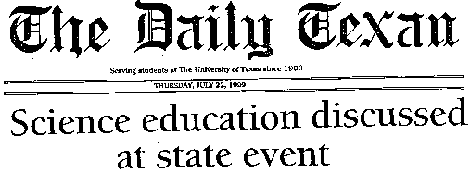
Emily Pyle, Daily Texan Staff
Science educators from across the state met Wednesday night at the Texas Regional Collaboration for Excellence in Science Education to discuss progress and goals in continuing teacher education.
Kellar Hall Daily Texan Staff Mac Thompson smashes a cinderblock over a board of nails atop Johnny Stephens. Thompson is a teacher at Western Hills High School in Fort Worth, and Stephens is a teacher at Western Hills High School in Palmer. The demonstration was part of the Sixth Annual University of Texas at Arlington Regional Collaborative for Excellence in Science Teaching.
“Our goal is to support science teachers with sustained professional development,” said Kamil Jbeily, director for Texas Regional Collaborative.
Sen. Eddie Lucio, D-Browns-ville, emphasized the importance of sustained education for science teachers. “I understand the importance of having teachers who are innovative and creative, who love children,” Lucio said. “Nothing can sustain this love like continued education.”
UT President Larry Faulkner said in his key note speech that fewer students are pursuing science at a college level. Faulkner said the attrition rate in the College of Natural Sciences is 55 percent, and 94 percent of those who remain in the college major in the health sciences or in computer science.
“Obviously, we need to do something to diversify,” Faulkner said.
Faulkner also noted that enrollment in the College of Engineering is declining, despite the flourishing economy and opportunities available across the country and in Austin.
“Students avoid these fields because there is a perception that they are hard, and they are,” Faulkner said.
He asked science teachers present at the meeting to cultivate a sense of wonder in their students.
“Students who have a sense of wonder are willing to work hard,” Faulkner said. “Students who have done something on their own know they can do more more.”
The Texas Regional Collaborative provides funding for 20 regions which attempt to match the funding and use the money to provide long-term education for science teachers, said Joel Blasingame, program coordinator for Texas Regional Collaborative.
Peggy Carnahan, director of the South Texas Rural Regional Collaborative, said her program works with small and rural school districts. The program has started a project, which currently has 49 degree-seeking members, to help teachers earn their master of education degree in integrated science.
Carnahan added that NASA had renewed a grant with the South Texas region for the third time. “We use the grant to educate teachers in geology and space curriculum,” she said. “We also encourage them to take their students to NASA. Many of our students have not left their districts before, and getting to go to NASA is a great opportunity.”
Blasingame said the continuing education of teachers has a direct effect on the future of the Texas economy.
“Think about Austin for a minute,” Blasingame said. “Everything is technology, everything is based on science and math. We want students to come out instead of knowing facts, knowing how to use scientific reasoning skills.”

